A robust postgraduate PhD journey with Nikolaos Toumasis
07/07/2023
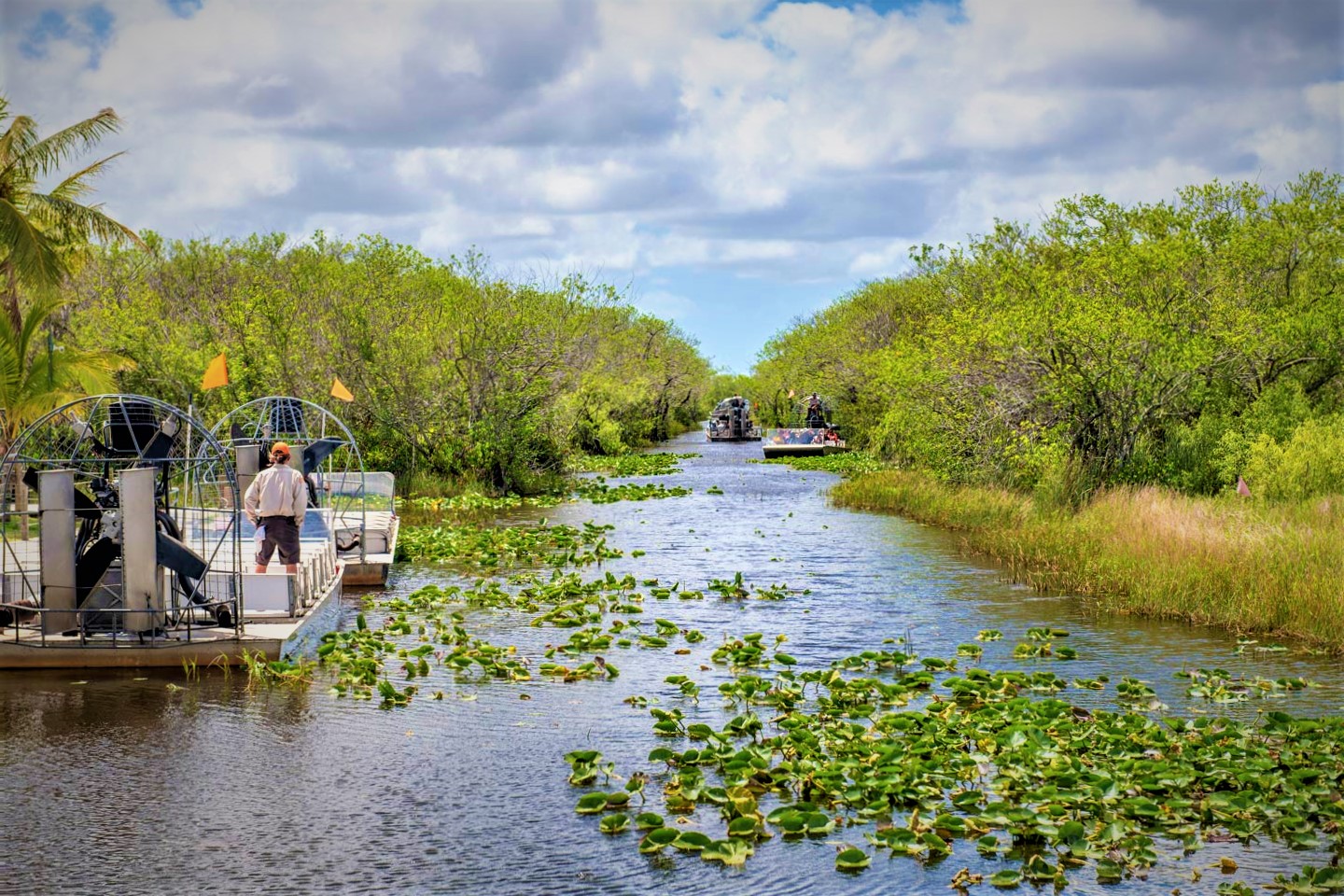
Nikolaos Toumasis is currently a Physicist-Meteorologist-Climatologist and PhD CENTA researcher in the School of Water, Energy and Environment (SWEE) here at Cranfield University. In this blog he shares details of his PhD project; what interests him, how that intersects with his areas of expertise and where he’s hoping the research will take him.
 My PhD project (summarised):
My PhD project (summarised):
As a systems ecologist, I am interested in the fundamental mechanisms underpinning ecology, analysing, and modelling ecosystem services, and assessing how to enhance connectivity in fragmented landscapes. My main areas of expertise include landscape ecology, woodland ecology, restoration ecology, and spatial ecology investigating the consequences of anthropogenic disturbances and the effectiveness of conservation actions, with a focus on finding effective ways to restore biodiversity, ensuring UK woodlands and grasslands are protected and resilient to future environmental changes.
My PhD research, entitled “Securing Lawtonian Landscape Resilience” has been based in Stormwater Treatment Areas (STAs) in South Florida and temperate human-modified landscapes in relation to monitoring and measuring landscape scale ecosystem processes. Lawton (2010) reviewed England’s biodiversity and ecological networks and concluded that biodiversity sites did not comprise a coherent and resilient ecological network, in the face of a changing climate and threats to biodiversity. We need to make our network of sites bigger, better, and more joined up and plan effectively to avoid further degradation. The UK Government’s 25-year environment plan sets goals for improving the environment, aiming to achieve a growing and resilient network richer in biodiversity, and this project answers the question, how to deliver these goals by means of green infrastructure investments informed by robust science.
The aim of this research was to determine the ecological resilience of the STAs and how capable they are to withstand perturbation, to analyse and understand resilience within the Everglades boundaries of South Florida, measuring resilience with Total Phosphorus (TP) and inflow-outflow concentration relationships in STAs for Everglades restoration and the built environment around it with the ultimate goal of shielding the area at risk of various challenges and disturbances through modern, functional, and secure solutions.
What sparked my interested in this field?
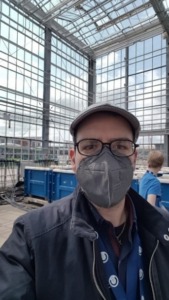
As a researcher keen on explaining the value of environmental studies to the public, Cranfield University is the perfect place for me to develop into the research scientist that I want to become, and will provide me with a foundation of skills that I think are so incredibly valuable for my career. This opportunity is going to be very rewarding and will be beneficial for my future ambitions to enter academia and contribute to a very important research field of environment, green infrastructure, and biodiversity. I want to pursue a research career and teach at university level. The development of a strong core skill set through a CENTA studentship will best enable me to do so. I have dreams of pursuing this field, and hopefully I will get the necessary tools to grow my passion into something big. I am very open to whatever opportunities the future may hold, especially in being flexible and adaptable.
By studying the phenomenon of resilience, and more specifically in the context of habitats, it is realised that it contributes substantially to the sustainable development of the areas. This project was seeking to investigate ecosystem complexity and those dynamic properties that emerge from functioning systems, such as resilience to perturbation. Understanding fundamental concepts of resilience signals, as well as how the system behaves on average, and indications of critical slowing down by conflicting viewpoints, we defined Correlation and Variance in the rainfall sum activity with inflow-outflow Total Phosphorus (TP) concentrations, consistent with gradually declining resilience. However, using these reference systems to define endpoints for restoration is increasingly difficult for two reasons: “pristine-native” states are often hard to define, and climate change is leading to a shifting baseline.
Determining the periodicity and looking at the ARIMA model and AR(1), and with the formulation of research questions and focusing on wavelets in water
quality data, we tested for the occurrence of temporal trends, signals of resilience in water quality (TP) data, and signals of critical slowing down-autocorrelation. Focusing on several ways, we explained the trends and other concepts using vivid examples-supporting tools to help with statistical analysis. We focused on connecting new knowledge with the R package and fundamental concepts of resilience. Produced statistical methods of Time Series analysis and wavelets decomposition of the Time Series underlying principles of biodiversity. We detected if the system changes, when perturbations happen, and how the variability changes as a function of the date and of scale.
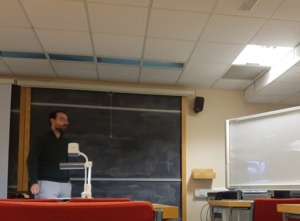
An analysis of the gaps identified between the currently available and required data for the research. Our analysis suggests that the primary distribution of total phosphorus in STAs after perturbations through flow-ways are associated with autocorrelation, accumulated or not, and may begin to follow the variance, as indicators of resilience, measuring such traits not just for preventing collapse, but also for improving the success of ecological restoration.
Moreover, I presented my research findings to the CENTA Conference on the 9 – 10 September 2021 at the University of Birmingham, and I had also the chance to have some productive meetings with Pre-CURe mentors and other organizers (CENTA PhD Reloaded/Devon2022) to talk more about the problems in the area of ecological resilience and stormwater storage and whether they are getting worse (climate change, etc.), and how do they impact people/businesses (Pre-CURe workshop, Warwick University). By submitting my video to the ICURe team I found the experience very beneficial for my next research steps.
Why did I decide to study in this field and undertake Doctoral Research?
I decided to undertake Doctoral Research for a number of key-reasons. It presents an opportunity to perform scientific research for an extended period of time in an area that excites me and that I consider to be of great importance. The focus on skill development will allow me to further enhance my ability to tackle big questions in the research career I want to pursue. Furthermore, I will build on my previous teaching experience but at a higher academic level. With acquiescence, I attended some meteorology, climatology, and air quality management courses.
These courses broadened my view of the techniques of climatological and meteorological strategy. Moreover, I attended many academic activities, such as lectures and debates, which served to further my interest in the environment, business, and economics. Equally important, I had the opportunity to raise challenging questions to internationally known scholars. I feel that I’m a good written communicator. My existing academic and professional work demonstrates an ability to put forward ideas clearly and concisely. I think this will help me manage the weight of information my PhD research needs to cover and the challenge of producing an effective thesis. The main inspirational figure for me in science and the natural world is Sir David Attenborough.
How do you think studying at Cranfield University will help your future prospects?
I have always been interested in discovering how things work in nature, and undergraduate study opened my eyes to the excitement and wider benefits of science. I had the chance to do some original research on my master’s and that’s inspired me to take up the challenge of a PhD at Cranfield University. Principally working in mathematical climate-change models, restoration ecology, and ecosystem services, my research focused not only on how ecology principles can be applied to our socio-ecological systems but also on the development of new methodologies for extracting useful patterns of Earth’s land cover using remote sensing data, by investigating our ability to restore functional ecosystems in line with Government plans.
I graduated in 2006 from the Technical School of Aviation (Military Academy-Air Training Command). In 2007, I gained a degree in Civil Aviation for the Certification Programme Introductory Training Air Traffic Controllers with a specialisation from the Hellenic Air Force as an Air Traffic Controller. In 2012, I gained a Bachelor of Science from the Faculty of the Department of Physics at the University of Ioannina. My MBA degree is in Human Resource Management and Leadership from Cardiff Metropolitan University. I obtained an MSc degree in Atmospheric Sciences and the Environment, and this dissertation was entitled “Biometeorology of Airports”, measuring of pressure, wind velocity, temperature, and humidity; outgoing long wavelength radiation, fluid mechanics, absorbed by the atmosphere (Earth’s Radiation Budget) and Climate Change-Impacts and Mitigation. Benefiting from the broad nature of ecology and working as a meteorologist-climatologist at the Laboratory of Meteorology (University of Ioannina), I have been exposed to an extensive range of subjects, from climate change to new technologies of remote sensing.
Having studied the specialised courses, Bioclimatology, Earth Observation Data Science, Meteorology, and Geophysics for Environmental Scientists (GGE NERC Geophysics course) at Keele University, I have gained essential knowledge in Environmental and Water Sciences, and I have acquired the essential skills of systematic research, analytical thinking, and restoration ecology evaluation. Most prominently, they provided me with insight into soil degradation and Flood Coastal Erosion with physics science. I was, in general, among the top three students in my classes.
Furthermore, I was privileged to be the only student in my department to work on the training project entitled: “Aerosol Effects in the Vicinity of Airports”. My training (F119-MAT) Postgraduate Research (PhD) at Heriot-Watt University, Department of Maths, was concerned with developing techniques of Data Assimilation in numerical weather prediction and climate change modelling, including basic regression analysis, variational approaches, Kalman Filtering, Bayesian inference approach, and formulating and implementing the Optimal Interpolation, 3-DVAR, 4-DVAR approaches, and Lorentz. My dissertation was entitled: ‘Data assimilation implementation on the Quasigeostrophic Fluid Model, using MATLAB for research problems, selection, and interpretation of the prior and posterior distributions’.
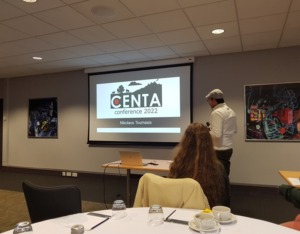
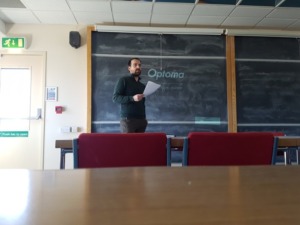
The highlights of my course and my future career plans
I am eager to combine my work with my supervisors and make use of the facilities Cranfield University has put together for this project, which can open up new lines of inquiry in this field, and I want to use them as the foundation for a fruitful research career. But I am also attracted by the opportunity to specialise and develop new expertise in the wider development opportunities included in this Doctoral programme. I moved away from my love of Biometeorology of Airports to focus on environmental sciences, ecology, and landscapes, however my professors focus on climatology and mathematics kept me fascinated by the environment within deep time. The culmination of these experiences and my postgraduate studies has inspired my interest in the natural world and ecological resilience. I’ve enjoyed my academic work so far, but I really feel I’ve got more to offer as a PhD researcher.
I’m keen to share my passion for this subject with a wider audience. By completing training of an interdisciplinary nature, I will be able to contribute to a number of high-quality research projects that will go on to conserve biodiversity by directing future environmental policy regarding landscape resilience. The RestREco study sites helped put my work into context by engaging with the project’s stakeholders and partners to evaluate the practical application of my research in supporting evidence-based decision making. This did, however, highlight the need for the third part of my project. I can struggle with conceptualising my work, and in making the transition between the theoretical framework of resilience and the case studies to which I am applying it.
My recent placement with the Natural England Coastal Team gave me this opportunity to start a new and challenging adventure, carrying out an interesting project to determine the inland extent of maritime cliffs and slopes with regards to saline influence. This piece of research will be important in improving my understanding of the inland potential in terms of habitat creation and making space for cliff recession, and it will feed into decisions around the new Maritime cliff and slope option. Having studied at a very high-level Python and Rstudio programming via statistical and mathematical modelling, I could investigate and model maritime influence (e.g., salt spray, maritime weather) around the English coast specifically with regards to cliff habitat and consider how this influences vegetation development in order to help improve understanding of habitat creation potential and in truly identifying the Maritime Cliff and Slope resource in England. I think the best way of planning for the future is to make the most of the present.
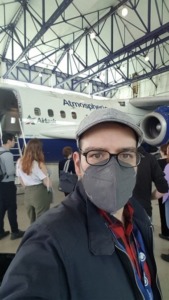
Atmospheric Research Aircraft, FAAM, FAA
My Cranfield experience so far
Developing coping mechanisms and boosting satisfaction in your work can be instrumental in building a successful research career. There are plenty of challenges to being an early-career researcher, but also plenty of rewards. I truly like the campus, and my experience has been very positive. The most important aspect of mine is that all academics and staff always have time to answer their students’ questions, even if they have quite busy schedules. Moreover, when feeling overworked and stressed, it is too easy to focus on the negatives, but one of the things that can carry us through the longest and most grueling of days is a sense of satisfaction in your research work. The best thing about being a Cranfield researcher is the opportunities that you have to work in partnership with businesses, academia, governments, and other organisations. Also, you have the chance to develop and deliver applied research and innovative education in science, technology, engineering, and management, allowing you to develop as a professional, and then transfer your knowledge to the global economy.
What aspect of face-to-face and online learning did you find most exciting?
I have been experimenting with different blended learning approaches in my postgraduate courses. The COVID-19 pandemic has accelerated the adoption of online teaching and learning but we need to make sure it blends effectively with more traditional learning approaches. Online learning has a lot of advantages because virtual meetings are as crucial as physical meetings. They are the only way to connect with your supervisors and colleagues. The interaction with tutors and supervisors is great because you can learn something beneficial from anyone you speak to. The most essential strategy is to maintain enthusiasm and pride in your work and protect your well-being, based on my own experience, building a career in higher education.
Categories & Tags:
Leave a comment on this post:
You might also like…
Company codes – CUSIP, SEDOL, ISIN…. What do they mean and how can you use them in our Library resources?
As you use our many finance resources, you will probably notice unique company identifiers which may be codes or symbols. It is worth spending some time getting to know what these are and which resources ...
Supporting careers in defence through specialist education
As a materials engineer by background, I have always been drawn to fields where technical expertise directly shapes real‑world outcomes. Few sectors exemplify this better than defence. Engineering careers in defence sit at the ...
What being a woman in STEM means to me
STEM is both a way of thinking and a practical toolkit. It sharpens reasoning and equips us to turn ideas into solutions with measurable impact. For me, STEM has never been only about acquiring ...
A woman’s experience in environmental science within defence
When I stepped into the gates of the Defence Academy it was the 30th September 2019. I did not know at the time that this would be the beginning of a long journey as ...
Working on your group project? We can help!
When undertaking a group project, typically you'll need to investigate a topic, decide on a methodology for your investigation, gather and collate information and data, share your findings with each other, and then formally report ...
From passion to purpose: My journey at the Pinnacle of Aviation
By: Sultana Yassin Abdi MSc Air Transport Management, Current Student Born and raised in the vibrant landscape of the UAE, with roots stretching back to Somalia, my life has always been ...







